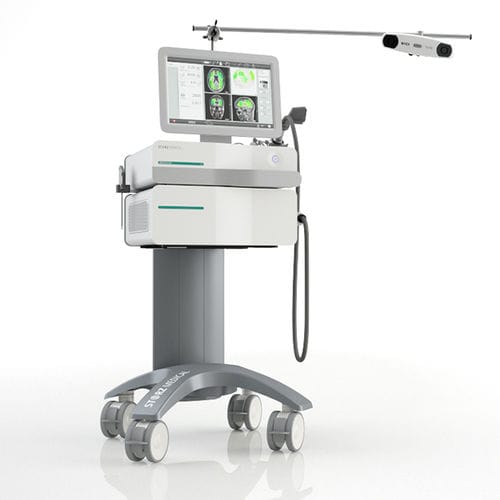
- Products
- TFUS transcranial ultrasound stimulator
- Storz Medical

- Products
- Catalogs
- News & Trends
- Exhibitions
TFUS transcranial ultrasound stimulator NEUROLITH®
Add to favorites
Compare this product
Characteristics
- Type of stimulation
- tFUS
Description
Transcranial Pulse Stimulation (TPS®) for the treatment of patients with Alzheimer's disease
What are shock waves?
Shock waves are acoustic pulses, which have been used successfully since 1980 for the treatment of various conditions. They allow physical energy to take effect in localised areas of tissue. Shock wave studies related to orthopaedic or cardiac indications show that shock waves promote mechanotransduction1, stimulation of vascular endothelial growth factors (VEGF)2,3 and the release of nitric oxide (NO)4. This results in improved blood flow and formation of new blood vessels (neoangiogenesis).
Shock waves vs. ultrasound
Shock waves are related to ultrasound waves, but the two technologies are fundamentally different. While ultrasound is characterised by a continuous wave with numerous oscillations, shock waves are characterised by a single pressure pulse followed by a tensile wave of lower amplitude. As a result of the high-frequency alternating exposure, the energy of the ultrasound waves is absorbed by the tissue and can lead to tissue heating – an effect that is not observed with shock waves.
Transcranial Pulse Stimulation (TPS®)
In Neurology, we refer to shock wave treatment with the NEUROLITH® as Transcranial Pulse Stimulation – TPS® for short. Other applications use high-energy shock waves, whereas TPS® uses low-energy waves to introduce energy into the tissue.
Patients with Alzheimer's disease were first treated in 2015 as part of a study at the University of Vienna5,6. The NEUROLITH® system with TPS is a device for the treatment of patients with Alzheimer's disease and has been CE-marked since 2018.
*Prices are pre-tax. They exclude delivery charges and customs duties and do not include additional charges for installation or activation options. Prices are indicative only and may vary by country, with changes to the cost of raw materials and exchange rates.
